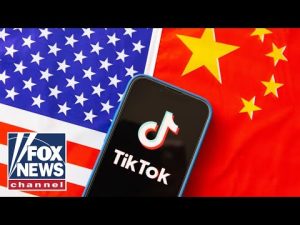In recent days, the talk of the town has revolved around tariffs and economic strategies that have some folks reaching for their stress balls. President Trump’s administration is pushing a bold agenda to manufacture America’s future, but the concern among critics, particularly those on the left, is palpable. They warn that current policies could lead us straight into the dreaded R-word—recession. When stock markets nosedive by 2,200 points overnight, you can bet that people are not sipping coffee peacefully; instead, they are watching their investments slip through their fingers.
U.S. allies are getting a bit of a wake-up call as tariffs have been implemented with a clear message: the U.S. is no longer going to take a backseat. In a recent commentary, a senior advisor to President Trump, Corey Lewandowski, shared insights about the president’s strategy. By imposing tariffs that are half the rates foreign countries charge the U.S., the administration aims to level the playing field. The mission is simple: prioritize American manufacturing. It’s the “America First” approach that seeks not only to protect American workers but also to send a clear message to other countries that the days of being taken advantage of are over.
But while Lewandowski and the administration make their argument, the critics do raise some eyebrows. People are undeniably worried about the immediate impacts on the economy, especially when many families are feeling the pinch from rising costs. Economic advisors and analysts have been sounding alarms, claiming that these policies could introduce chaos into the markets. Amidst all this apprehension, one can’t help but wonder if this is merely a short-term pain for long-term gain in the art of negotiation.
Lewandowski shared details of a recent trip to Latin America, where he explored the serious issue of immigration and public safety. During visits to countries like Colombia and Mexico, he encountered the stark reality of gang violence and the measures taken to combat it. With President Trump’s plans emphasizing deportation and stricter immigration policies, Lewandowski described a chilling yet clear message offered to those in the U.S. illegally: register or face serious consequences. The message is thus sent loud and clear across the border—illegally crossing into the U.S. is no longer a game of cat and mouse.
Furthermore, the conversation shifted to the recent IPO of Newsmax and its evaluation as a significant player in providing conservative news. As Lewandowski articulated, this emerging media outlet stands as a beacon of hope for those seeking an alternative to mainstream media narratives that often don’t resonate with conservative audiences. With a thrilling market response, it seems that viewers are turning their backs on traditional media giants in favor of platforms that promise honest dialogue and transparency. All in all, it’s a fascinating time in the realms of politics and media, reminding us that the tides can turn rapidly in today’s news cycle.
In a nutshell, it’s clear that the Trump administration is forging ahead with its plans, whether or not the naysayers agree. They are positioning the U.S. as a power player on the global stage while tackling issues like immigration and the economy with a firm hand. In the end, only time will tell if this strategy pays off or if the critics’ worries are justified, but one thing is for sure: right now, American politics is a thrilling rollercoaster ride. Buckle up!







